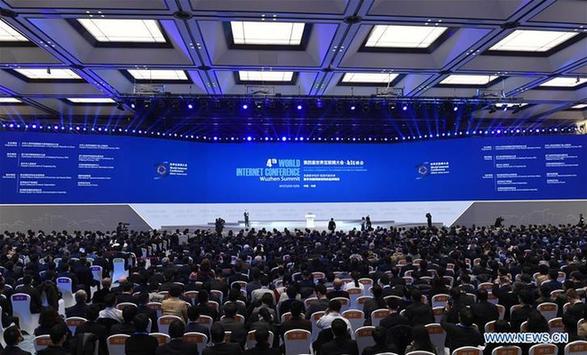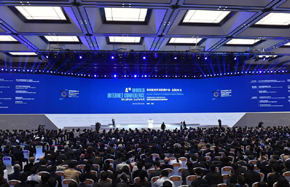WIC should address benefits, challenges of the internet
|
 |
|
Delegates attend the Fourth World Internet Conference in the water town of Wuzhen, East China's Zhejiang province, Dec 3, 2017. [Photo/Xinhua] |
The fourth World Internet Conference (WIC) opened Dec 3 in the ancient town of Wuzhen in Zhejiang, China. In this unassuming little ancient town, the past and future world meet together, history joins technology to fuse the present with the future. The internet is the future, considered the fourth industrial revolution – one that China will not miss out on this time, as the country is deeply involved in charting the course of this amazing innovation that would forge a common destiny for humankind.
The theme of the Conference said it all: "Developing digital economy for openness and shared benefits -- building a community of common future in cyberspace". The rapid advancement of the internet and its pervasive penetration across the world and to every remote corner of the earth, changing lives and how industries operate, is only the beginning of the power of the internet. The world is never the same again. Businesses are never the same again, as communication, transportation, retail, education, logistics, medicine, trade and industry, finance and banking are all changing. The internet is reshaping everything in every way possible to better improve business operations and efficiency with hyper speed.
The internet has developed an industry of its own, known as the digital economy, and also supports the real economy. The internet has even carved out its own niche in warfare involving satellites, robots, artificial intelligence and super computers. Cyber warfare is a major field of military science and strategy arising from the use of the internet and cyberspace; so is cyber espionage.
The WIC will discuss how the internet can continue to develop and to improve the lives of all people across the world. Many new initiatives, concepts and innovations will be revealed and introduced during the conference to harness the immense potential power of the internet, which is really in its early stages of application. In its few decades of existence, the internet is already touching all aspects of life and all people in a world of instant gratification. Everything is moving at light speed, a pace never before known. The modern world would literally come to a standstill without the internet.
There are many challenges with the advent of the internet. To ensure that the internet continues to function smoothly and efficiently, the perpetual problems of securing the internet as well as the safety of the internet and protection of users would again be key topics of discussion at the fourth WIC. The internet needs protection to be allowed to function at peak efficiency without breaking down or being crippled by hostile parties with criminal intent and destructive agendas. These include hacking, scams, spamming, fake news, ransomware and internet warfare, all intent on immobilizing the internet. The security of goods and services and users has never been so threatened before. A concerted effort by governments of the world to police and ensure internet security is of paramount importance and increasing urgency. Will the internet experts and community at Wuzhen rise to the occasion to tackle these serious problems of the internet and arrive at some action plans?
The fourth World Internet Conference has many serious topics for discussion. It will be important for the participating countries and delegates to have something on the table regarding the security of the internet and cyberspace, such as a set of protocols, code of conduct, and regulations and laws to regulate the internet. The internet is now too big to be left alone to evolve on its own without a formal body or authority to regulate its use and activities. Internet governance is long overdue.
China has raised the concept of cyber sovereignty similar to territorial sovereignty. With a big mix of countries of different political systems and stages of development, cyber sovereignty is gaining recognition and importance in how the internet should be regulated worldwide. No country should be allowed a free hand to determine how the internet should be governed and impose its values on other sovereign states. No country should be allowed to conduct political espionage and cyber terrorism against other states using the internet. Hopefully a consensus can be reached to establish a world body to oversee and to protect the development of the internet and the digital economy. A better and more connected world can only be positive for humankind, with each and every state, big and small, having a say in its governance, with sovereignty in cyberspace protected and respected.
The author is a political observer from Singapore.
?
























